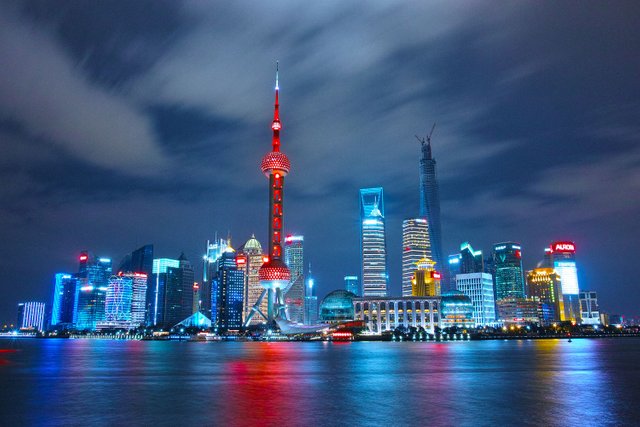What's going on in China - 中國發生了什麼

❗️ We now, for obvious reasons, write little about international affairs. But they couldn't get past this. Read. After all, something simply unimaginable is happening in Shanghai.
Residents of the most populous city in China, which is home to 26 million people, have been sitting at home for 2 weeks without food and essential goods. The authorities have set strict rules: only doctors, volunteers, couriers and those who have special permission are allowed to go outside.
In the evenings, people start screaming from the windows that they need food and water. Products are delivered, but in insufficient quantities. Sometimes enough for one meal a day. Elderly single residents who do not have modern smartphones and, accordingly, the ability to order food are at particular risk. Drones are flying over the city, monitoring the fulfillment of the demand and broadcasting a recording with a request not to yell or sing from the windows.
Delivery services are overloaded, there are not enough couriers. Grocery stores and government distribution groups are failing to cope. Prices went up, which made it even less possible for people to fully feed themselves.
Isolation at home is prohibited - only in special institutions. Shanghai is turning schools, new buildings and large exhibition halls into isolation centers, the largest of which can accommodate 50,000 people. More than 60 such objects have already been created.
People live in them side by side with thousands of strangers, without walls and showers, with dirty shared toilets, without blankets and hot water, with ceiling lights at any time of the day. And they fight for food.
The sick are isolated from the healthy and from each other. Even very young children who test positive are taken away from their parents.
The closure of Shanghai, one of China's economic centers, also raises concerns about the impact on the economy, including the world. The city's products account for 4% of China's GDP. Here is the world's largest port, through which about 20% of China's exports abroad pass. A two-week lockdown will cost the Chinese economy nearly $30 billion.
On Sunday, Shanghai reported 25,173 new cases of coronavirus infection. Globally, the figure is not so large, but for the city itself it is critical - this is the most serious outbreak since the outbreak of the disease in 2019 in Wuhan. Mass testing, tracing and quarantine of EVERYONE who has tested positive is underway. Even if there are no symptoms.
China is sticking to its “dynamic approach to zero COVID” as other countries try to live with the virus. Many highways are closed. There were problems with the delivery of critical supplies (food, medicine, hygiene products). Authorities believe that easing restrictions would be catastrophic given the danger the Omicron option poses to people with chronic diseases, the elderly and the unvaccinated.
❗️ 我們現在,出於顯而易見的原因,很少寫國際事務。但他們無法克服這一點。讀。畢竟,上海正在發生一些根本無法想像的事情。
這座擁有 2600 萬人口的中國人口最多的城市的居民已經在家中呆了兩週,沒有食物和必需品。當局製定了嚴格的規定:只有醫生、志願者、快遞員和有特殊許可的人才能出門。
晚上,人們開始從窗戶尖叫他們需要食物和水。產品已交付,但數量不足。有時一天一頓飯就夠了。沒有現代智能手機並因此無法點餐的老年單身居民面臨的風險尤其大。無人機在城市上空飛行,監控需求的實現情況,並播放一段錄音,要求他們不要在窗戶上大喊大叫或唱歌。
送貨服務超載,沒有足夠的快遞員。雜貨店和政府分銷集團未能應對。價格上漲,這使得人們更不可能完全養活自己。
禁止在家隔離——僅限特殊機構。上海正在將學校、新建築和大型展覽館變成隔離中心,其中最大的可容納5萬人。已經創建了 60 多個這樣的對象。
人們與成千上萬的陌生人並肩生活,沒有牆壁和淋浴,有骯髒的共用廁所,沒有毯子和熱水,一天中的任何時候都有天花板燈。他們為食物而戰。
病人與健康人和彼此隔離。即使是檢測呈陽性的非常年幼的孩子也會被從父母身邊帶走。
作為中國經濟中心之一的上海的關閉也引發了對包括世界在內的經濟影響的擔憂。該市的產品佔中國GDP的4%。這裡是世界上最大的港口,中國大約20%的對外出口要經過這裡。為期兩週的封鎖將使中國經濟損失近 300 億美元。
週日,上海報告了25,173例新的冠狀病毒感染病例。這個數字在全球範圍內並沒有那麼大,但對於這座城市本身來說卻是至關重要的——這是自 2019 年武漢爆發該病以來最嚴重的一次疫情。正在對所有檢測呈陽性的人進行大規模檢測、追踪和隔離。即使沒有任何症狀。
當其他國家試圖與病毒共存時,中國堅持其“動態零零方法”。許多高速公路都關閉了。關鍵物資(食品、藥品、衛生用品)的運送存在問題。當局認為,鑑於 Omicron 選項對慢性病患者、老年人和未接種疫苗的人構成的危險,放寬限制將是災難性的。
中國有自由正常生活的權利! 我敦促中國人民與那些讓你們生活在惡劣條件下的人分開。 你們是 14 億人。 中國政府大約有100萬人+政府警察——大約2000萬。
你可以自由,抗拒!